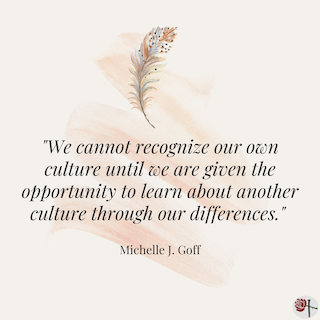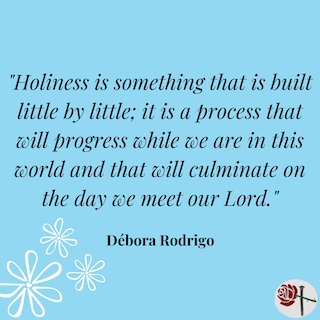Search Our Blog Posts
Blog Article Tags
We love building relationships. Subscribe to our blog to receive weekly encouragement in your email inbox.
- Details
 Written by Michelle J. Goff
Written by Michelle J. Goff
Cross-cultural communication is fascinating. As a child, I was introduced to different cultures within our home, starting with my parents… Dad is a PhD Chemist who grew up in a small farming community on the Iowa/Missouri border. Mom is a special education elementary school teacher who grew up in the metropolitan city of Miami.
Dad always leaves doors unlocked. Mom locks all the doors immediately.
Dad prefers ordinal directions (north, south, east, west). Mom gives directions based on landmarks.
Dad makes the bed with the top sheet a certain side up. Mom makes the bed with the top sheet the opposite side up.
Some of these differences are not significant. Others have been a big deal… One of the first mornings as a married couple, it took them three hours to make the bed because of their different preferences on how to make a bed. When they have taught premarital counseling classes regarding “first year adjustments,” they ask the couple to make a bed together, then share their own story.
Within our own families, we create a culture and an expectation. “Normal” is all we have ever known, until we are introduced to someone else’s normal.
I remember Chinese students coming to our home for Sunday lunch and learning how to use a knife and fork to eat the traditional pot roast, potatoes, and carrots. There were no chop sticks, nor rice on our Southern American table. Yet, later, South Americans, like Venezuelans, reminded us that they were American too. Our Puerto Rican friends loved to eat and share the slightly burned rice on the bottom of the pot… a sign that you are family. Have you ever thought about some of those cultural differences?
We cannot recognize our own culture until we are given the opportunity to learn about another culture through our differences.
When we look at the concept of Culture Redefined, here are three questions we can ask ourselves:
1. What have I learned about my own culture in light of another’s culture?
2. What have I learned about someone else’s culture—what we have in common and areas in which we have unique perspectives?
3. What facet of the Christ-like, Kingdom culture should I most emulate in this context or relationship?
Since it is football season in the U.S., I will share that my football culture is one of an LSU Tiger. When I took a group of LSU students up to Ole Miss for a game, we marveled at the differences between tailgating in those two SEC towns. We shared a deep love of football, but probably a deeper love for our team than for the sport itself.
Our Christian culture was challenged when the rival fans began to taunt us, throw things at us, and mistreat us. We recognized that not all LSU fans are also Christians. We also know that not all Ole Miss fans are Christians either. If all Christian football fans are being honest, sometimes our football culture may overshadow our Christian culture.
Family culture, church culture, language culture, local culture, sports culture, school culture… Culture does an excellent job of providing connection and community. However, if our culture is to the exclusion of others, is it a culture that honors Christ?
When Jesus began His ministry, He welcomed individuals from diverse cultural backgrounds to be a part of His Kingdom: Samaritans, tax collectors, fishermen, those with disabilities, Zealots, women, Pharisees… and many more. Some accepted His invitation into a new culture and others did not.
We are each a unique combination of the various cultures we have embraced and emulated. When those cultures are in conflict, how do we choose?
How does God call us to navigate the redefining of culture?
1. We must seek first God’s definition of culture in Christ. It must take precedence over any other cultural markers (Matt. 6:33; 1 John 4:1-6).
2. Cultural redefinition is a process of transformation (Rom. 12:2; 1 Cor. 3:17-18).
3. Our new identity in Christ is the most important foundation of culture, further developed through the Spirit (Gal. 2:20; Acts 2:38; Gal. 5:16-25).
What are your thoughts about culture?
How has your culture been redefined through your coming to Christ?
- Details
 Written by Débora Rodrigo, volunteer with Iron Rose Sister Ministries in Spain
Written by Débora Rodrigo, volunteer with Iron Rose Sister Ministries in Spain
When I was a teenager, I was struck by those TV shows in which physical appearance professionals doing a complete makeover for common people. The changes ranged from hairstyles, haircuts, wardrobe remodeling, makeup, and many other recommendations that never went beyond their physical appearance. At the end of the TV show, it wasn't easy to recognize the person from the beginning. I often wondered if, after the show ended, the participants would continue assuming that new appearance in their day-to-day or if it would be just a one-time experience. I always doubted it.
When a person decides to become a follower of Christ, another series of changes occurs in him. In this case, it is about not-so-superficial changes, but deeper ones. Changes from within the soul and the inner being, even when many of them can also be seen from the outside. But these are not changes that happen one time and that’s it. It is a process in which new changes will be gradually added and in which, additionally, an effort must be made, often intentional, to maintain them. Holiness is not something that we can suddenly attain or that others can bestow on us. Holiness is something that is built little by little; it is a process that will progress while we are in this world and that will culminate on the day we meet our Lord.
Colossians 3 compares conversion and the process of holiness to a change of clothes. When we started our walk with Jesus, we put our old clothes aside and began our walk with a new outfit. Little by little, we are completing and adding accessories to our clothing. In this case, it is an outfit much more in line with our personality and who we are, and what we have decided for ourselves; not at all like those TV shows made to entertain the masses.
Speaking in spiritual terms, can you see a change in style throughout your life? How would you describe your new outfit? What accessories do you still have to add to it?